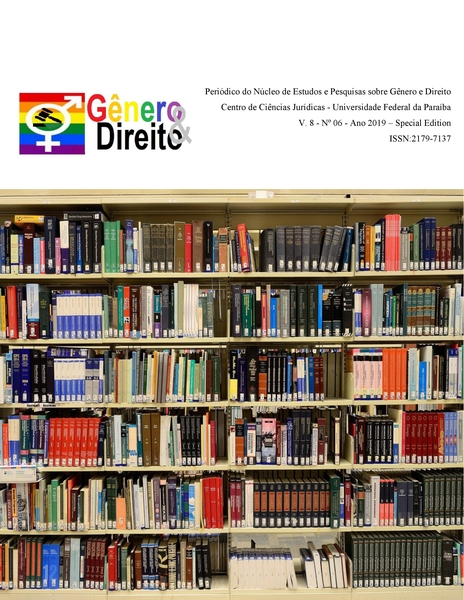CORRUPTIBILITY OF LEGAL RULES:
THEORETICAL PROBLEMS
DOI:
https://doi.org/10.22478/ufpb.2179-7137.2019v8n6.49192Palavras-chave:
corruption, corruptibility, properties of legal norms, consistency in law, legal expertise, defects of lawResumo
The article considers the problem of corruptibility of legal rules. The author proceeds from the fact that some legal norms stimulate illegal corrupt behavior of participants in public relations. The task is to explain how corruptibility affects the generally recognized properties of the legal rules. The author describes the distortion of such properties of a “healthy” legal norm as formal certainty, general obligatoriness, systemic interconnection and provision with the state coercion power. We analyzed the “Methodology for conducting anti-corruption expertise of regulatory legal acts and draft regulatory legal acts” approved by the Government of the Russian Federation. We established the correspondence of corruptibility factors given in the Methodology to negative modifications of the properties of a “healthy” legal norm. We specifically considered various aspects of systematicity in the context of the concept of corruptibility. We revealed the interdependence of the properties of a corruptogenic norm. It is concluded that the primary textual uncertainty creates uncertainty in the consequences, destinations and systemic relationships of the corruptogenic norm, which is eliminated in the course of interaction between the corrupt person and the corrupt official. The corruptogenic norm, while not being essentially legal, continues to be provided by the state coercion power and remains connected with other norms and institutions that are part of the legal system until it is identified as corruptogenic, distorting their meaning and adoption purposeDownloads
Não há dados estatísticos.
Referências
R.F. Stepanenko, “The Cause of Corruption: Methodological and General Legal Problems”, Leningrad Journal of Law, vol. 53, No. 3, pp. 73–84, 2018.
Akhil Gupta, “Changing Forms of Corruption in India”, Modern Asian Studies, vol. 51, № 6, pp. 1862–1890, 2017.
Harvey.G. Kebschull, “Political Corruption: Making It the "Significant Other" in Political Studies”, Political Science and Politics, vol. 25, № 4, pp. 705-709, 1992.
R.G. Valiev, “On the Corruption Status of Enforcement Discretion”, Legal Studies, No. 12, pp. 1 – 10, 2018.
V.S. Nersesyants, “Law as a Necessary Form of Equality, Freedom, and Justice,” Sociological Studies, No. 10, pp. 3-15, 2001.
N.N. Voplenko, “Essays on the General Theory of Law”, Volgograd: VoGU Publishing House, 2009.
E. Zelt, “John Austin” [Электронный ресурс], Stanford Encyclopedia of Philosophy., URL: https://plato.stanford.edu/entries/austin-john/, (дата обращения: 11.06.2019).
Alan E. Steinweis, Robert D. Rachlin, “The Law in Nazi Germany and the Holocaust” (pp. 1-15) in the book “The Law in Nazi Germany: Ideology, Opportunism, and the Perversion of Justice”, NY.: Berghahn Books, Inc., 2013.
Danny Singh, “Challenging corruption and clientelism in post-conflict and developing states”, Crime, Law and Social Change, vol. 71, pp. 197–216, 2019.
N.A. Vasilchikova, “Measures of the prosecutor’s response to corruptogenic factors identified in the regulatory legal acts”, Bulletin of the St. Petersburg University of the Ministry of Internal Affairs of Russia, No. 1, pp. 104-107, 2012
Akhil Gupta, “Changing Forms of Corruption in India”, Modern Asian Studies, vol. 51, № 6, pp. 1862–1890, 2017.
Harvey.G. Kebschull, “Political Corruption: Making It the "Significant Other" in Political Studies”, Political Science and Politics, vol. 25, № 4, pp. 705-709, 1992.
R.G. Valiev, “On the Corruption Status of Enforcement Discretion”, Legal Studies, No. 12, pp. 1 – 10, 2018.
V.S. Nersesyants, “Law as a Necessary Form of Equality, Freedom, and Justice,” Sociological Studies, No. 10, pp. 3-15, 2001.
N.N. Voplenko, “Essays on the General Theory of Law”, Volgograd: VoGU Publishing House, 2009.
E. Zelt, “John Austin” [Электронный ресурс], Stanford Encyclopedia of Philosophy., URL: https://plato.stanford.edu/entries/austin-john/, (дата обращения: 11.06.2019).
Alan E. Steinweis, Robert D. Rachlin, “The Law in Nazi Germany and the Holocaust” (pp. 1-15) in the book “The Law in Nazi Germany: Ideology, Opportunism, and the Perversion of Justice”, NY.: Berghahn Books, Inc., 2013.
Danny Singh, “Challenging corruption and clientelism in post-conflict and developing states”, Crime, Law and Social Change, vol. 71, pp. 197–216, 2019.
N.A. Vasilchikova, “Measures of the prosecutor’s response to corruptogenic factors identified in the regulatory legal acts”, Bulletin of the St. Petersburg University of the Ministry of Internal Affairs of Russia, No. 1, pp. 104-107, 2012
Downloads
Publicado
2019-11-26
Como Citar
CH. SHARAKSHINOVA, T. .; F. STEPANENKO, R. . CORRUPTIBILITY OF LEGAL RULES: : THEORETICAL PROBLEMS. Gênero & Direito, [S. l.], v. 8, n. 6, 2019. DOI: 10.22478/ufpb.2179-7137.2019v8n6.49192. Disponível em: https://periodicos.ufpb.br/index.php/ged/article/view/49192. Acesso em: 4 abr. 2025.
Edição
Seção
Seção Livre

